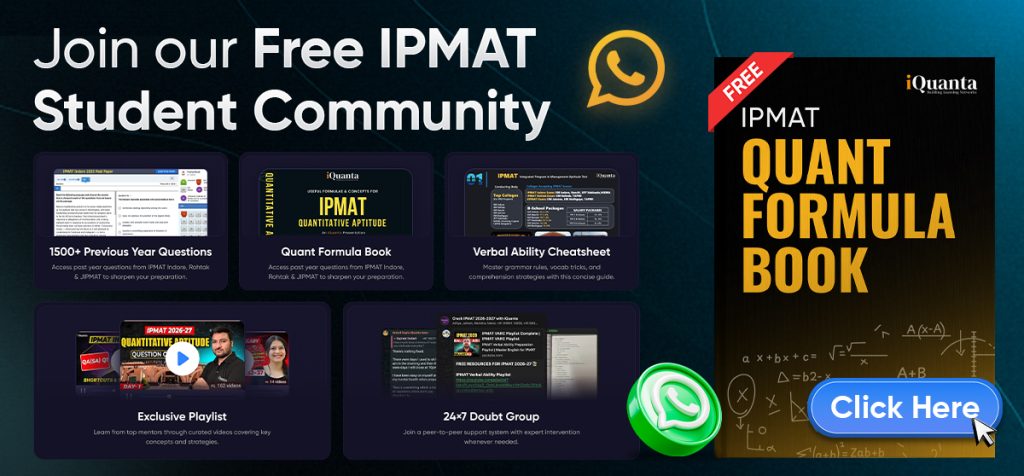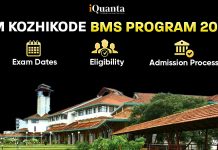JIPMAT (Joint Integrated Programme in Management Aptitude Test) will be conducted by the NTA (National Test Agency) across 75+ cities in 2026 for admission into the 5-year combined management programme known as IPM (Integrated Programme in Management). IIM Jammu, IIM Bodhgaya, TAPMI, and a few other notable business schools accept admissions for the dual-management programme. Most students prefer to appear for the JIPMAT as it’s easier than IPMAT Indore, IPMAT Rohtak and can be cracked with basic preparation strategies. If you have decided to prepare for JIPMAT exam, then get a detailed understanding of the JIPMAT Syllabus 2026 in advance to achieve good results. The JIPMAT Syllabus 2026 comprises three different sections, i.e, Quantitative Ability (QA), Verbal Ability and Reading Comprehension (VARC) and Data Interpretation and Logical Reasoning (DILR) respectively. You will get 150 minutes to solve the entire JIPMAT 2026 question paper. Click here to access JIPMAT PYQs and take up your preparation game to the next level. Trust us! You will score high and deliver an outstanding performance in JIPMAT 2026.
The application window for JIPMAT will open in February 2026, and the last month to register for the JIPMAT 2026 Exam is March 2026. Visit the JIPMAT official website to complete the registration procedure. Before that, go through the section-wise syllabus distribution for JIPMAT 2026 and indulge in vigorous preparation to achieve the desired cut-off and secure entry into IIM Jammu, IIM Bodhgaya or TAPMI to pursue the IPM Programme. The JIPMAT Syllabus 2026 for Verbal and Analytical Reasoning (LR) is quite similar to the IPMAT Rohtak, and it’s comparatively easier to crack JIPMAT, unlike IPMAT Indore and IPMAT Rohtak. In this blog, we will be talking about JIPMAT syllabus 2026 along with exam pattern and marking scheme, JIPMAT Syllabus for Quantitative Ability, Data Interpretation & Logical Reasoning as well as Verbal Ability & Reading Comprehension.
Join this free IPMAT preparation group to get free study material, strategies by toppers and experts, latest updates and more

JIPMAT Syllabus 2026, Exam Pattern and Marking Scheme
A prior understanding of the JIPMAT Syllabus 2026 will help you frame a well-balanced and structured preparation plan. Start with high-ROI topics first to develop a thorough understanding, and then move to basic and intermediate topics. This is the best approach to score maximum marks in the JIPMAT Exam 2026. Note that although there is zero marking for an unattempted question but for every incorrect attempt, you will get -1 mark, and it’s applicable in all three sections of JIPMAT 2026. Upon qualifying for JIPMAT 2026, check the eligibility criteria for IIM Jammu and IIM Bodhgaya, as both these prestigious B-schools have separate admission criteria for IPM admission. Let’s now update you about the JIPMAT marking scheme, exam duration and total question count in a detailed manner.
| JIPMAT Marking Scheme | |
| For every incorrect answer | -1 |
| For every correct answer | +4 |
| JIPMAT Exam Pattern | |
| Subjects | Questions |
| Quantitative Ability | 33 |
| LRDI | 33 |
| VARC | 34 |
Note: The total number of questions in the JIPMAT exam is 100 which is further categorized into Quantitative Ability, LRDI and VARC along with the total time duration of 150 minutes.
Short Overview: JIPMAT Syllabus 2026
The table mentioned below covers all the major sections including Quantitative Ability (QA), Verbal Ability and Reading Comprehension (VARC) as well as Data Interpretation and Logical Reasoning (DILR) across JIPMAT Syllabus 2026. The total marks for the Quantitative Ability section covers 132 marks, Verbal Ability and Reading Comprehension (VARC) covers 136 marks and the Data Interpretation and Logical Reasoning (DILR) covers 132 marks with overall marks covering 400. The complete overview for the JIPMAT Syllabus 2026 is mentioned in the table below.
| Sections | Total No. Of questions | Time Limit | Every Correct Answer | Every Incorrect Answer | Unattempted Answer | Total Marks |
| Quantitative Ability (QA) | 33 | 150 Minutes | +4 Marks | -1 Marks | 0 | 132 |
| Verbal Ability and Reading Comprehension (VARC) | 34 | +4 Marks | -1 Marks | 0 | 136 | |
| Data Interpretation and Logical Reasoning (DILR) | 33 | +4 Marks | -1 Marks | 0 | 132 | |
| 3 Sections | 100 | – | – | – | 400 |
JIPMAT Syllabus 2026 For Quantitative Ability (QA)
All the mathematical topics covered in the Quantitative Ability (QA) section of the JIPMAT Syllabus 2026 are mainly from the 10th grade. In comparison to the questions that are asked in the quants section of the IPMAT Indore and IPMAT Rohtak, JIPMAT is extremely easy to crack in the first attempt. It serves as a huge benefit for candidates who hail from a non-mathematical background. Below, we are sharing the detailed list of all the topics that sum up the QA section of the JIPMAT.
QA Topics For JIPMAT 2026 Exam
The table mentioned below covers the detailed understanding of the JIPMAT 2026 Quantitative Ability syllabus. It contains topics like Number System, Algebra, Arithmetic as well as Geometry.
| JIPMAT 2026 Quantitative Ability Topics | Important Chapters |
| Number System | Finding Unit Digit, Factorials, Divisibility Rules, Simplification, HCF LCM Of Fractions, HCF & LCM, Remainder, Theorems, Surds & Indices, Concept of Factors |
| Algebra | Linear Equations, Quadratic Equations, Trigonometry (Only till 10th Grade), Algebraic Formulae, Cubic Equations Indices & Surds |
| Arithmetic | Average, Percentage, Partnership, Ratio & Proportion, Age-based problems, Boats & Streams, Profit Loss & Discount, Time and Work Time, Speed & Distance, Simple & Compound Interest, Mixture & Alligations |
| Geometry | Quadrilaterals, Basics of Geometry, Coordinate Geometry, Trigonometry, Height & Distance in Trigonometry, Mensuration, Lines & Angles, Triangles, Circles, Polygons |
JIPMAT Syllabus 2026: Data Interpretation and Logical Reasoning Syllabus
If you’re preparing for the IPMAT Rohtak 2026, then you can easily identify that the same topics are included in the JIPMAT Syllabus 2026. Your critical-thinking and problem-solving abilities are evaluated through the DILR Section. You will have to interpret questions related to charts, graphs, tables, etc. and solve them. Solving puzzles and providing logical solutions are also another core segment of the LR section. See the common DILR topics that you will have to cover to achieve a decent score in the JIPMAT Exam 2026.
DILR Topics For JIPMAT 2026 Exam
This section covers the detailed JIPMAT syllabus of the DILR (Data Interpretation and Logical Reasoning) section along with topics such as Verbal Reasoning, Analytical Reasoning & Data Interpretation. The detailed information about the same is mentioned in the table below.
| JIPMAT 2026 DILR Topics | Important Chapters |
| Verbal Reasoning | Statement & Assumption Facts & Inferences Analogies Statement & Conclusion |
| Analytical Reasoning & Data Interpretation | Bar Graphs and Table-based DI Sets Data Interpretation Sets, Linear and Circular Seating Arrangement, Mirror & Water Image, Clock and Calendars, Pattern-based images, Cubes and Dice, Cutting and Coloring, Logical Sequence, Series Distance & Direction, Number and Letter Series, Data Sufficiency, Input output, Blood Relations, Line Charts & Pie Charts, Venn Diagrams, Coding-Decoding, Ranking, Inequalities, Syllogism |
Data Interpretation | Caselets, Bar Graphs, Distance & Direction, Data Sufficiency, Mirror & Water Images, Tables, Linear & Circular Arrangements, Pattern-based DI, Line Charts, Inequalities, Pie Charts, Ranking |
JIPMAT 2026 Exam VARC Syllabus
Strong grammar, fluent vocabulary and spectacular comprehension skills are the key ingredients to excel in the VARC section of the JIPMAT exam. It has the highest weightage (36%), and with proper preparation, every candidate can score maximum marks in this section. Go through the table addressed below, which consists of the JIPMAT Syllabus 2026 for the VARC section.
JIPMAT VARC Syllabus For 2026
The JIPMAT Syllabus for the VARC section is important to cover where it is easier to score good and creates impact when candidate have good percentile in the Verbal Ability and Reading Comprehension section. The detailed information about the JIPMAT VARC Syllabus 2026 is mentioned in the table below.
| JIPMAT Syllabus 2026 VARC Topics | Important Chapters |
| Grammar | Adverb & Verb Noun & Pronoun Active – Passive Voice Direct & Indirect Speech Idioms & Phrases Etymology & Roots Subject-Verb Agreement Figures of Speech Prepositions Articles Conjunctions |
| Vocabulary | Synonym &Antonyms Analogies Spelling Errors Odd One Out One Word Substitution Word Usage |
| Reading Comprehension | Particular word meaning from the passage Author’s Tone Passage Tone Original Passage Main Idea |
| Verbal Ability | Spot the error Complete the sentences Fill in the blanks Para jumbles Correct the sentences Sentence Improvement |
How Should I Cover the JIPMAT Syllabus 2026?
The ultimate mantra to complete the JIPMAT Syllabus 2026 early or on time is a strong preparation plan. You should have a strategic approach to enhance your conceptual knowledge and never miss out on mock test practice. Each section of the IPMAT Syllabus is different from the previous one. Henceforth, you need to plan accordingly and take a detailed analysis of the entire syllabus to obtain an overall good score. We are sharing some useful preparation strategies that you can follow throughout your preparation journey until you reach the final destination, whether it’s IIM Jammu, IIM Bodhgaya or TAPMI in 2026.
Best Strategies To Cover JIPMAT Syllabus 2026
| Major Sections | Valuable Tips |
| Quantitative Ability | Consider solving a minimum of 35-40 questions from every topic to brush up on your foundational knowledge. Go through the past year’s questions from the quants section and analyze the most asked questions, frequent topics, etc. Join iQuanta to receive a personalised schedule, effective preparation tips and learn from the best industry experts. |
| Verbal Ability and Reading Comprehension | Start reading English newspapers, academic articles, top editorials and books to develop reading speed and master comprehension skills. Practice different types of RC passages which have distinct structure, words and difficulty level to get familiar with the original exam pattern. |
| Data Interpretation and Logical Reasoning | Prefer to solve a huge variety of logical questions, which should be a mix of basic, intermediate and tough ones. Aim to solve at least 3-5 sets of every topic and practice questions from the past year papers too. Learn how to analyze patterns and round numbers for making quick calculations. |
JIPMAT Syllabus 2026: Section-Wise Preparation Strategy
JIPMAT stands for Joint Integrated Programme in Management Aptitude Test and before appearing for the actual exam it is important for candidate to build a focused preparation approach and especially section-wise which covers the Verbal Ability and Reading Comprehension, Data Interpretation and Logical Reasoning as well as Quantitative Ability. The detailed section-wise preparation strategy for JIPMAT Syllabus 2026 is mentioned in the detailed below.
JIPMAT VARC Syllabus Preparation Strategy
The VARC section preparation strategy for the JIPMAT syllabus requires a proper reading habit which requires the consistent reading of newspapers, editorial and other genres along with the proper mock test series preparation along with practice.
JIPMAT DILR Syllabus Preparation Strategy
DILR section is the important one where student can get the good score with the help of consistent practice although it is a tricky section but it is manageable. The JIPMAT DILR syllabus preparation strategy covers the amazing sets that needs to practice along with the sectional tests and mock test series.
JIPMAT QA Syllabus Preparation Strategy
Last and very important section is the Quantitative Ability where candidates will have a chance to score maximum with the consistent practice of question which are having high weightage. This section requires maximum practice of PYQs along with topic-wise practice of question.
How iQuanta Can Help You Complete the JIPMAT Syllabus 2026?
Since 2015, we have managed to build a huge and trustworthy student community who have shown their trust by choosing us for their CAT Preparation. Slowly, we progressed towards the other competitive exams like the IPMAT, SNAP, XAT, NMAT, etc. Students who have joined iQuanta to prepare for the JIPMAT have qualified and made it to a widely recognized B-school to pursue a combined management degree (UG-BBA + PG-MBA), which lasts for 5 years. Sharing our unique JIPMAT Preparation Course features, due to which we have become the most renowned and preferred online coaching platform to start the preparation for the JIPMAT exam.
- A separate focus is given to candidates who didn’t pursue mathematics in the 10th and 12th grades.
- You can watch and practice questions from more than 100+ videos on the fundamental VARC topics.
- We follow a dual pedagogy teaching style (live stream+practice sessions) to complete the JIPMAT Syllabus 2026, provide useful books for JIPMAT preparation, mock test sessions, offer form-filling assistance and share personal interview preparation tips.
- Short videos (10-15 minutes) on necessary VARC concepts are also available to build proficiency in assumptions, inferences, and understanding the author’s tone, etc.
- iQuanta Experts follow a 7-step approach to elevate the conceptual knowledge of the students in every batch.
- You can drop your doubts 24*7 in the preparation communities and will receive an accurate response within the next 15-30 minutes.
Important Tips to Prepare for JIPMAT 2026
JIPMAT is one of important examinations along with IPMAT after class 12th to enter in a top management institutes like IIM Bodh Gaya, IIM Jammu for pursuing the 5 year Integrated Programme in Management (IPM). To ace this competitive exam and stand out among the pool of aspirants, candidate have to follow the effective preparation for JIPMAT 2026. There are some important tips that are required to prepare for Joint Integrated Programme for Management Aptitude exam.
- Consistency is the vital part to prepare strategically for the JIPMAT exam. It consist a vast syllabus across QA, VARC and DILR which needs to be revised to get a proper grasp of concepts.
- To check current performance candidates should cover several mock test series to reflect the exam-like conditions.
- Time management is the way to go factor not only for JIPMAT but any competitive examination to complete the entire JIPMAT 2026 paper within the specified time limit across sections.
Final Words: JIPMAT Syllabus
To appear for JIPMAT 2026, a candidate must fulfil the basic academic requirements and then only can proceed with the online registration. Before that, one must acquire vital information regarding the JIPMAT Syllabus 2026 across the VARC, DILR and QA sections. In short, the questions from these categories are asked to assess the analytical skills, mathematical conceptual knowledge, art of data interpretation, appropriate word usage, sentence correction, grammar, vocabulary, etc. On attaining the cut-off score as per your reservation category, you will gain entry into IIM Jammu or IIM Bodhgaya. Henceforth, to accomplish a remarkable score in JIPMAT 2026, you must start your preparation with iQuanta through online preparation courses. Till 2024, we have taught, guided and supported 100+ students to crack JIPMAT, IPMAT Indore and IPMAT Rohtak. Who knows, you can be the next shining star to crack the JIPMAT Exam 2026 and establish a progressive career in the management domain.
If you are looking for a structured preparation for IPMAT along with 24×7 doubt solving, then you can go for iQuanta’s IPMAT Course

Frequently Asked Questions – JIPMAT Syllabus 2026
You must study consistently for 5-6 hours for the next 7months to cover every particular topic from the JIPMAT Syllabus 2026. Ensure that you practice mock tests regularly for performance analysis and improvement. Devote equal time to every topic and focus on studying the high-weightage topics during the initial stage of the JIPMAT Exam Preparation to attain the maximum score. Avoid spending a significant time on a particular topic. Assign a specific time to cover every topic and practice sessions.
Topics included in the Logical Reasoning ( Analytical and Data Reasoning) and Verbal Ability and Reading Comprehension section of the JIPMAT 2026 Exam will be similar to the IPMAT Rohtak. Kindly check the JIPMAT & IPMAT Rohtak (Past Year Question Papers) to get an idea about the types of questions, repeated questions, etc.
JIPMAT 2026 will take place in April End 2026. Start your preparation for the JIPMAT Exam 2026 now, and you will make the most of it. You will have enough time to study every topic due to which your time management skills and productivity graph will improve. Besides this, you can complete your JIPMAT Syllabus 2026 way ahead of time and can allocate the remaining time for constant practice.
JIPMAT Syllabus 2026 is easier than the IPMAT Indore but similar to the IPMAT Rohtak. The complexity level is low and the QA sections mainly include mathematical topics from the 10th grade, such as Geometry, Algebra, Arithmetic and Number System. Thus, even the students from a non-maths background could easily crack the JIPMAT Exam in the past years and secured admission into the IIM Jammu, IIM Bodhgaya or TAPMI to pursue a dual management degree known as IPM.
It’s possible to cover the overall JIPMAT Syllabus 2026 in 90 days if you follow a bulletproof preparation plan and stick to the timetable. Master key topics from every section and be consistent every day. Study for at least 5-6 hours on weekdays and 9-10 hours on the weekends. Once you complete the syllabus, appear for mock tests regularly. The results will give you clarity about the weak topics so that you can work on them to enhance your performance.




